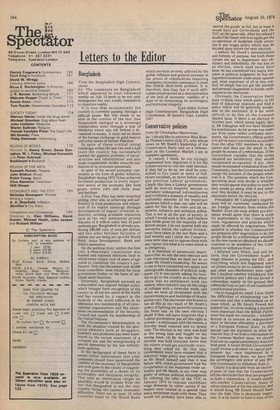Bangladesh
From the Bangladesh High Commissioner
Sir: The comments on Bangladesh which appeared in your esteemed weekly on July 13 seem to be not only intemperate but also totally insensitive to objective reality.
It is true that economically the country is currently passing through a difficult, phase. But this needs to be seen in the context of the fact that Bangladesh emerged as a sovereign independent state through a war of liberation which also left behind a devastated economy. It recei7ed no share of the foreign exchange or gold reserve and other assets of former Pakistan.
In spite of these critical initial handicaps within the last two and a half years the country has successfully tackled the gigantic problems of reconstruction and rehabilitation and also made considerable strides towards realisation of its economic potentials.
In spite of the severe economic constraints in the form of global inflation, Bangladesh during 1973-74 has achieved increased production in every important sector of the economy like food grams, cotton. yarn and cloth, steel and fertiliser.
A Five Year Plan has been launched aiming, inter afia, at achieving self-sufficiency in food production and expansion of its export earnings through development of export oriented industries, utilising available resources such as the very substantial proven deposits of 9 trillion cubic feet of pure methane gas. Bangladesh is already producing 500,000 tons of urea per annum and two other fertiliser factories of similar size are being set up with World Bank, Asian Development Bank and India's assistance.
On the political front, within the first year a democratic constitution was framed and national elections held in which every citizen over 18 years of age voted to constitute the country's parliament. Only last December over 40,000 local councillors were elected for local government bodies on the basis of universal adult franchise.
Externally, Bangladesh pursued an independent non-aligned foreign policy which brought forth recognition of the country by all but few states of the world and has earned for it respect in the councils of the world reflected in its admission into membership of all international organisations and the unanimous recommendation of the Security Council last month for membership of the United Nations, The Government's determination to meet the situation created by the antisocial elements such as smugglers, hoarders, and profiteers has been manifested by the recent enactment of a stringent law and the strengthening of special operations by the law enforcement agencies.
In the background of these facts it seems rather unfortunate that your comments should have questioned the viability of the economy of Bangladesh and even gone to the extent of suggesting the possibility of a threat to its sovereignty and territorial integrity. That such an observation verges on absurdity would be evident from the fact that Bangladesh is not the only country facing the current economic difficulties. There are at least 19 other countries listed by the World Bank which are most severely affected by the global inflation and general increase in the prices of commodities requiring emergency economic assistance to meet this critical short-term problem. It is, therefore, less than fair if such difficulties are projected as a demonstration of the lack of economic viability of a state or as threatening its sovereignty and territorial integrity.
Syed Abdus Sultan High Commissioner, Bangladesh High Commission, 28 Queen's Gate, London SW7.
































 Previous page
Previous page